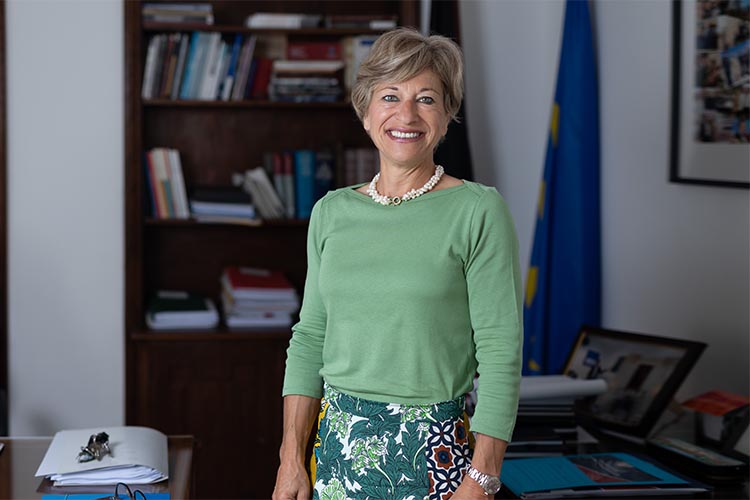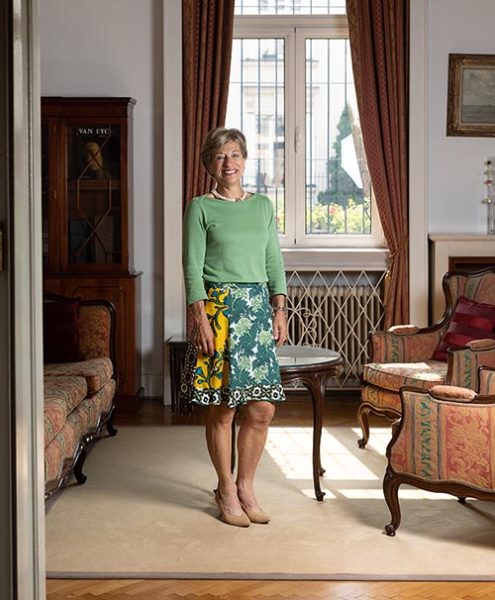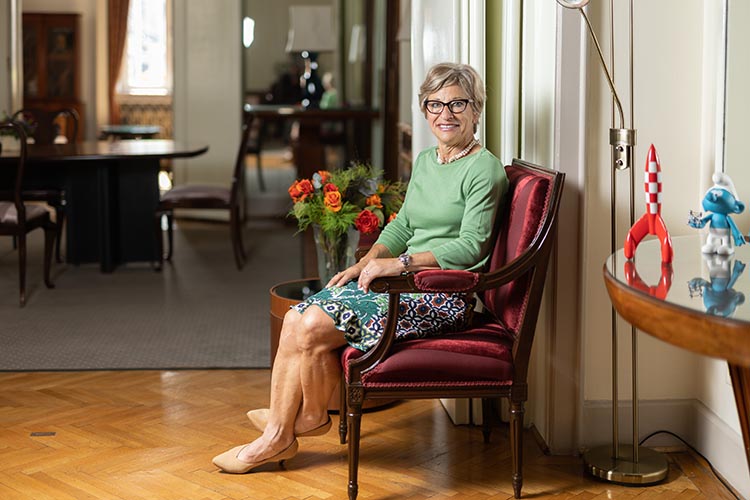I personally believe that there’s never been a more urgent need to have a strong, meaningful and result-oriented dialogue between the EU Member States and our closest neighbours, such as Serbia, on the issues of European stability, security, energy security and economic resilience ~ Cathy Buggenhout
Belgian Ambassador Cathy Buggenhout is no stranger to Serbia, having actually worked in Belgrade back in 1996, when she was responsible for bilateral economic relations. She recalls the post-Dayton atmosphere of the time and the start of the lifting of sanctions against Serbia. “Time flies,” she admits in this interview for CorD Magazine, adding that the country has changed a lot since 1996. Noting that Belgium welcomes Serbia’s ongoing EU accession negotiations, she insists that the country’s rightful place is in the Union. “just take a look at the map of Europe and you can’t but conclude that Serbia’s place is in the EU”.
Your Excellency, with your appointment as Belgian ambassador to Serbia last year, you returned to Belgrade after a 26-year break. Could you compare and contrast the two periods of your work in Serbia?
Time flies. I have just finished the first year of my tenure in Serbia and it went by in a flash. Just like during my six-month stay in 1996, the experience of living here is very positive, both at the professional and the private level. Of course, there are changes compared to 1996. Back then, with the Dayton Peace Accords having just been concluded and international sanctions just lifted, the atmosphere in Belgrade was obviously less buoyant than it is today. But the kindness of the people was the same. I remember organising a ministerial visit and a trade mission to Belgrade in 1996. Now that I come to think about that trade mission, I remember that the head of the Belgian delegation was not very “equal rights for women”- minded. Such an attitude would not be permitted these days. In January this year, I was a proud participant in an event organised by the Association of Business Women in Serbia, held at the Palace of Serbia. Equal rights are close to our Belgian hearts. but a lot of work still remains to be done on equal rights, and not only on women’s equal rights.
One challenge that we face is finding ways of coping, as a very small Embassy team, with the wide range of activities that contribute to our excellent bilateral relations
Obviously, another difference between 1996 and now is the European Union accession process of Serbia, which my country fully supports. Just take a look at the map of Europe and one cannot help but conclude that Serbia’s place is in the EU.
How would you rate current bilateral relations between Belgium and Serbia; where do you see the biggest challenges?
Challenges are there to be overcome. There is one challenge that comes to my mind: how to cope as a very small Embassy team with the wide range of activities that contribute to our excellent bilateral relations. For instance, in the cultural sector alone, a Belgian dance company opened BITEF last Autumn, we had a ton of events all over Serbia in the Month of the French Language (Francophonie). During the coming Autumn, there will be Belgian participants in the Belgrade Saxperience Festival and the 60 Belgrade International Meeting of Writers.

Then there is our excellent joint judicial cooperation following Belgium’s lead role in cracking the SKY ECC network. And I rejoice in the fact that Belgian investments in Serbia are increasing, albeit slightly. Both our countries also have fruitful cooperation in the field of renewable energies, with Belgian company Elicio being a founding member of the Renewable Energy Association of Serbia. The list of my Embassy’s activities is long, and sometimes it seems like a race, as there are so many things to do, but it is and will always be an honour to contribute to our Serbian- Belgian relations.
Belgium will take over the rotating presidency of the European Union at the start of next year. How is the notion of EU enlargement viewed in your country and will Belgium place this topic on the agenda of its presidency?
Maybe this is not the most original reply to your question, but our point of view is how it was stated at the European Council in June: a full and unequivocal commitment to the EU membership perspective of the Western Balkans and our support for the merit-based accession process and related reforms. Rule of law is a cornerstone of the EU, and we look forward to reforms by Serbia in this area. Furthermore, we wish to see Serbia take a step further by aligning with EU foreign policy. As for the Belgian Presidency in the first half of 2024, we are part of the Trio with the current Presidency of Spain and with Hungary, which will take over the Presidency after Belgium. The Trio Programme was launched in June. Our three countries reiterated their commitment to move the enlargement process forward in accordance with the new methodology. We, all EU27, agreed on this methodology. Belgium applauds the deeper regional economic integration that would already use EU rules, as this will facilitate integration into the EU single market.
Belgium applauds the deeper regional economic integration that will already use the rules of the EU, as this will facilitate integration into the EU single market
Moreover, I personally believe that there has never been a more urgent need to have a strong, meaningful and result- oriented dialogue between the EU Member States and our closest neighbours, such as Serbia, on the issues of European stability, security, energy security and economic resilience. I was therefore very pleased when European Integration Minister Tanja Miščević announced that Serhonour bia is ready to start finalising its EU accession, with an absolute focus on the results of the reforms that represent the essence of that process. I fully agree with Minister Miščević’s statement that we have been witnessing just how important it is to have a strong and united Europe.
The attention of the Serbian public has in recent weeks been drawn to the news of the suspension of the military equipment export license of a Belgian company from Liège for allegedly violating sanctions against Russia by exporting goods via Serbia. Could you tell us whether the details of those alleged transactions have been established, as has been announced?
There were allegations of some foreign media about the alleged export of weapons and military equipment from the Republic of Serbia to the Russian Federation. Therefore, in mid-July, a delegation of the Walloon Region visited Serbia to verify the exports of military equipment for which Walloon export licences were issued to the company New Lachaussée.

This visit was graciously hosted by Yugoimport, which received the delegation in Belgrade. During this visit, the Walloon Region delegation received full and transparent information from the Serbian authorities. The export licences were reinstated a couple of days after the conclusion of the verification visit.
Your diplomatic career has often seen you focused on international trade. How do you see the current level of economic cooperation between Belgium and Serbia, and which areas do you consider as being favourable for advancing bilateral economic relations?
This question makes me smile, as I count the World Trade Organisation and EU Trade Policy among my favourite fields of work during my diplomatic career. Both are fundamental in our international rules-based order. Bilateral economic relations between Belgium and Serbia are healthy, and growing. Over the past twelve months, I discovered a formidable and efficient Belgian-Serbian Business Association. One of our own Belgian-invested companies here in Belgrade has just made a new flashy logo for the BSBA, on which we already published a sneak preview, but which will only be revealed to a wide audience on 11 September. Belgium does well on the Serbian market. Remember Maxi-Delhaize, a large Belgian investment in 2011. And when one drives to Nikola Tesla Airport, the motorway – just like the Belgrade Fortress and Kalemegdan Park – is illuminated by Belgian company Schréder – which is the oldest Belgian investor in Serbia, by the way, having been here since 1969!
Personally, it always amazes me that there is so much talk here in Serbia about the “nationality” of a company. For me, in a globalised economy, our companies are global too
Businesses in my country are traditionally SMEs. These companies are always slightly more hesitant when it comes to venturing out into the “unknown” – meaning a country that’s not yet a member of the WTO or the EU – because these smaller and medium- sized companies are less resilient when their foreign operations don’t work out or aren’t conducted transparently. Personally, it always amazes me that there is so much talk here in Serbia about the “nationality” of a company. For me, in a globalised economy, our companies are global too. Let me explain by giving an example.

In Novi Sad, there is a stateof- the art chocolate company called Barry Callebaut. It is classed as Swiss, because the capital is Swiss. But to my Belgian heart, this company is also “one of ours” because, before several take-overs, Callebaut was Belgian. I was born five kilometres from the (still current) production site of Callebaut. So, in my eyes, regardless of who owns it, one should rejoice in the economic success of a multinational company, regardless of its size, on the Serbian market. That’s because healthy investments and healthy trade contribute to the wellbeing of all our citizens.
The arrival of Belgian company JAGA in Kragujevac was announced recently. The Chamber of Commerce & Industry of Serbia stated the ambition for Serbia to become a “hub for Belgian high-tech companies”. Is there interest among other companies in following JAGA’s path?
I know JAGA from my time in China, and I bought their heating system for my house when returning from China to Brussels. JAGA has a showroom in Shanghai, where heating/ cooling elements in the shape of the Rolling Stones Hot Lips logo are on display. JAGA is not only a top technology company, but its products can also be a form of art. So, yes, both my trade representative Marijana Milošević- Tufegdžić and I are delighted to welcome JAGA here. We plan a visit to Kragujevac, and we will make it a day trip because there is another major Belgian investor in the food business there.
As for Belgian-invested high-tech companies in Serbia, several are already here, such as UnifiedPost and Eyesee Research, and Serbian engineers are excellent. And, as you probably know, nothing beats word of mouth advertising! So, the Embassy’s doors are wide open to welcome more Belgian high-tech firms to Serbia.
| COOPERATION Our excellent joint judicial cooperation is following Belgium’s lead role in cracking the SKY ECC network | REFORMS Rule of law is a cornerstone of the EU, and we look forward to reforms by Serbia in this area | INVESTMENTS Healthy investments and healthy trade contribute to the wellbeing of all our citizens |
|---|